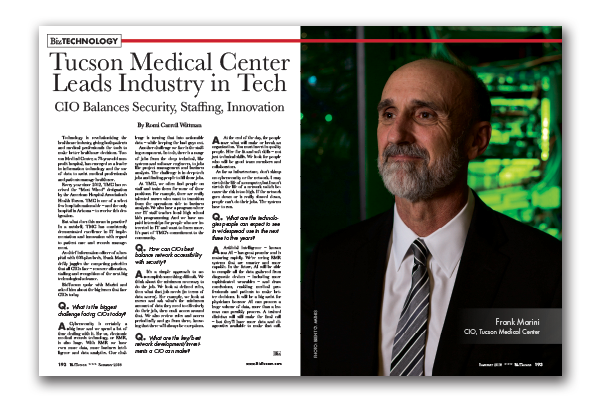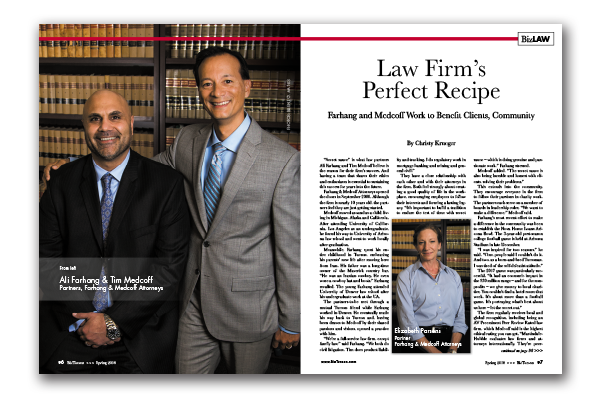
Making Music
By Dan Sorenson –
The “siege” just passed – the annual back-to-school onslaught of school band and orchestra students and their parents descending on Instrumental Music Center to rent and buy new instruments.
When the numbers are tallied, Michael and Leslie Faltin will learn whether the $100,000 they laid out for a shiny pile of new brass retail and rental instruments paid off.
In truth, there isn’t much drama anymore. With the exception of a couple down years during the recession, Instrumental Music Center has piled success upon success.
It was just 13 years ago when the couple – he was a band director at a Sunnyside School District middle school and she was selling lasers for a local optics firm – mortgaged their house and opened Instrumental Music on the northwest corner of Speedway Boulevard and Kolb Road.
After the recession’s hiccup years, when they quickly tightened up expenditures to roll with the economic punches, they’re again racking up rising sales figures, have expanded the store twice, and last year added a second location at 405 E. Wetmore Road. In June they were on the cover of Music Inc., a leading retail music industry magazine that took note of what they’re doing right.
To put a number on it, they went from mortgaging their house to doing $1.8 million last year, Leslie said.
The success isn’t in merely surviving the recession. They also swam upstream against the online sales and chain store trends that devastated the independent retail music stores that once dominated this business locally and nationally. (Beaver’s Band Box, a leader in the Tucson school band and orchestra retail business for decades, went under during the recession, as did Guitars Etc. and some smaller stores that mixed lessons and retail sales.)
You can’t out-do Guitar Center, said Leslie of the futility of going head-to-head with the huge retail chain that, with the recession and the boom in online sales, crushed scores of mom-and- pop stores nationwide over the last 10 years.
So, Michael said, they do some things Guitar Center and many of the other stores don’t do. They rent out eight rooms to music teachers for lessons, bringing in students and parents year around. They do repairs. And, something learned during the recession, they found their niche and trimmed high-priced instruments from their inventory.
“We changed parts of our inventory as the economy went south,” Michael said. “Most people aren’t going to come in and drop $2,000 on an acoustic guitar. Ten years ago they would. But I can sell you a solid (wood) top acoustic guitar by Yamaha for $200 and it’s a great guitar. For a long time, we didn’t have a guitar over $1,000. But I have more $300 and $400 guitars than anybody. We buy things that fit the Tucson market – what I call a value market.”
But even so, there are plenty of places customers can shop in that value end of the market. “We know that our closest competitor is the closest smart phone,” Leslie said of the competition from online sellers.
They handle that competition by knowing their clientele. “The bulk of our business is school musicians. It’s moms and minivans,” Leslie said. The partners understand that – and not just in the marketing sense. Leslie’s 41, Michael’s 47 and they have two kids, 7 and 8. “We’re really mom and pop. My mom works for me. My sister – the inventory queen” – works for me, too,” Leslie said.
When minivan moms come in the store, they see clearly posted prices, close enough to the bone to compete with the online sellers. And the staff doesn’t do high-pressure pitches.
“Everyone in the music industry works on commission,” she said. “We don’t. I don’t want the mom talked into the $600 guitar if that’s not what works best for her student.”
The team works closely with local school teachers to get instruments into the hands of kids.
Laurie McBride, who has taught music at Tucson’s Castlehill Country Day School for 15 years, said Instrumental Music “is near and dear to my heart.’’
“Hands down, Mike and Leslie operate the most organized music store in Tucson,’’ McBride said. “Instrumental Music Center is quick with special orders, they have reasonable turn around times on repairs and excel at customer communication and service. It has been my pleasure doing business with them since their store opened.’’
The Faltins learned some valuable lessons during the recession, and in the battle against chains and the Internet. That’s not to say they’re fighting it out in some desperate battle against the competition and the economy. In fact, they attribute some of their success to a positive, and tangible, attitude.
“We’re doing great. Things could always be far worse. We don’t live in Darfur. People need to keep that in perspective,” Leslie said. “I meet a lot of music industry people who are down in the dumps. But there’s always something you can do. And we’ve done it –
make sure we’re not too extravagant.
“And one of the biggest things is not to bitch about the economy. Nobody wants to do business in a place that’s not doing well. That’s kind of a downer.”





